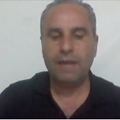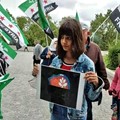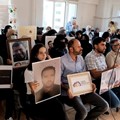Electronic violence against women in northern Syria
Violence against women is no longer confined within the confines of their narrow or close society, but rather to virtual reality and the ease of communication and communication brought about by the technology revolution. A large segment of women is subjected to online abuse through social networking sites.
In the north of Syria, a group of women was violently persecuted by society simply because they did work and activities that were unfamiliar at an earlier time, according to the testimony of several activists to the (Verify) platform.
The United Nations defines violence against women as “any act of gender-based violence that results in physical, sexual or psychological harm or suffering to women, including threats of such acts, coercion or arbitrary deprivation of liberty, whether in public or private life."
Ghalia Rahal of Mazaya Women’s Organization says: “The violence resulting from social media is more directed when discussing topics that were previously marginalized, born with the Syrian revolution in 2011, especially the political role of women and their legal rights, especially inheritance and other rights that society included. He considers them to be internal issues between families that cannot always be talked about publicly, so when going into these topics, waves of attacks, criticism, insults and electronic verbal violence begin, which often prompt girls to reconsider the reason why these comments surface and how they can be confronted, knowing that the beneficiaries are human beings and they have Feelings that are upset, sad and afraid of their families’ reactions at first sight if they see the number of insults against them, but then they try to harness this violence as a point of strength with which to treat the imbalance in society in general to reach a benefit that accrues to all of them.
Women driving cause accidents!
On the twenty-eighth of last September, Syria TV published a report on women driving in Idlib, and on the experience of a woman training women to drive, but the report was met with a reprehensible and deplorable reaction to women driving, and this appeared in the comments that carried derogatory verbal expressions against women...
Haneen al-Sayed, a Syrian journalist working with Syria TV, says: "I prepared a report on teaching women driving cars, and as soon as the report was presented and published on social media pages, thousands of abusive comments about the report and its contents flooded out."
She adds that in Syria TV, they were forced to delete all the offensive comments, which numbered more than four thousand comments offensive to women in general, and the trainer in particular.

Sample comments on Mazaya Center post
The report's author tells Verify-Sy platform the extent of the psychological damage that the trainer suffered after the report spread, as she was subjected to a defamation campaign that went beyond Syria TV's page and spread on dozens of pages and personal accounts, which made her live in a state of psychological tension that prevented her from appearing in the media during the campaign period.
Another television report shown on the "Aleppo Today" channel dealt with women driving cars in northern Syria, and 24 hours after its broadcast, the channel was forced to permanently delete the report from its pages at the request of the report's editor, Salwa Abdel Rahman.


Salwa told Verify-Sy platform, "One of the girls who appeared in the report contacted me and talked about their experience of driving and requested that I delete the report immediately after I read the negative comments that were poured upon her in the comments on the report on social media."
As for the woman covered in the report, she was physically tired and fell under psychological pressure, and was subsequently transferred to the hospital due to the ridicule and ridicule that befell her, according to the author of the report.
The report's author explains that, despite the approval of all the women surveyed before filming, the reaction of a certain segment of people in the form of comments offensive to women as a whole psychologically exhausted them and caused them a state of shock and fear of reappearing in the media.
Women's café
On the eleventh of June, several news websites published news about the opening of a café for women in the city of Idlib, including the Syria Stream platform affiliated with Syria TV, which presented a visual report on the café, and some women saw in it a new step in the region that would allow some of the greater privacy.
The director of the women's café, who preferred not to be named after being bullied and verbally abused, was surprised by the uproar that occurred on social media after the publication of a television report about the café she had opened.
She told (Verify) platform, "I thought a lot about closing the café and withdrawing from the project as a reaction to the violence I was subjected to, but the women's love for the idea and their encouragement to continue made me challenge the negative view and bad talk, and it continued."
The woman spoke of her shock at the ridicule and accusation of affiliation to a party, which prompted her to refuse to appear in any media report that might address the subject.
She added that the amount of negative comments made against women in general, and those in charge of the project in particular, is highly insulting and only suggests violence towards women's work, especially if the issue is a new and unfamiliar step for society.
As the comments that followed the report, which was filled with expressions of condemnation and disapproval and was not devoid of insults and professional expressions against women, reached the point of commenting in terms of a sexual nature with the intent of insulting women. Several Idlib city residents denounced that women have privacy and that these councils (cafes) are not a custom of the people of the region, and are nothing more than backbiting and gossip sessions and a distraction from the basic duties of women.
Activist Rahal says, "The political, legal, and other rights of women are considered by society as internal issues between families that cannot be talked about publicly." And she adds, "When these topics are discussed in the public sphere, waves of attacks, criticism, insults and electronic violence begin, which often prompt girls to reconsider the reasons why these comments resurface.
Women's center.. mobile maintenance and repair
On the second of October, Al-Jazeera channel presented a report that talked about a women's center, the first of its kind in northern Syria, for the maintenance and repair of mobile phones.
Negative comments revealed the amount of violence against women by a large segment of men, and their exposure to violence increased, as happened with the issue of women driving, opening a cafe of their own, and working in a mobile maintenance center, all of which are acts that society classifies as permissible for men and denounces women.
Waad al-Abdullah, an activist in the Association of Free Syrian Lawyers, confirms in a statement to the (Verify) platform, "The electronic bullying that women are subjected to has become a weapon used by the bully to ridicule women for any work they do through social networking sites, which allowed many anonymous people to express their opinion. Women’s Rights.” Al-Abdullah stated that bullying causes psychological illnesses for the victim, such as depression and isolation from society, and at other times, attempts to commit suicide.
Facebook is an incubator of violence against women
On the fifth of last October, the "Plan International" organization launched a campaign entitled "Freedom to Presence on the Internet" after its research, in which it spoke to 14,000 girls in 22 countries around the world, showed that more than fifty percent of them had experienced violence and harassment via the Internet. Internet.
The research shows that one out of every five girls has been forced to limit their use of social media, partially or completely, because of this violence. According to the report, this type of violence occurs through all social media, but Facebook is the largest incubator, followed by Instagram and “and” WhatsApp, Snapchat, Twitter, and Tik Tok.
Activists in the city of Idlib believe that social media has given women a space of freedom that does not exist on the ground, and this is what enabled them to express their opinion without any fear, threat or violence that they may be exposed to, but what happens is that social networking sites intensify violence And bullying against women and at other times the violence reached the stage of sexual harassment via the Internet.
net.






